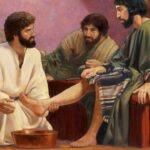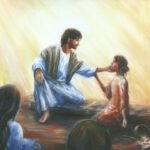The Ego and PrideBy: HH Pope Shenouda III Only a person who is wrongly concerned about himself, or who loves himself in a wrong way, falls in pride. He grows in his own eyes and likes to be great in the sight of the others, or even to be greater than the others. Examples of …
The Ego and Pride
By: HH Pope Shenouda III
Only a person who is wrongly concerned about himself, or who loves himself in a wrong way, falls in pride. He grows in his own eyes and likes to be great in the sight of the others, or even to be greater than the others.
Examples of those who grow in their own eyes:
An example is a person who looks long in the mirror to enjoy seeing his own beauty! Even in the past, the people wanted to build a city and a tower in Babylon with its top in the heavens, to make themselves a name (Gen 11: 4)! Believe me, brothers, those were perhaps less proud than the people of our days who want to go to the Moon to put the flag of their country, or to Mercury to occupy it, to dwell there, or to organize trips there!
Such are the examples of the human mind that imagines things satisfying its pride. King Herod was of such a type. He wanted to be great in the sight of the others. He sat on his throne and was pleased to be glorified by them when they said, “The voice of a god and not of a man!” As he did not give glory to God, an angel of the Lord immediately struck him, and he was eaten by worms and died (Acts 12: 22). Haman is another example, in the reign of King Ahasuerus he persecuted Mordecai, because the latter did not bow or pay him homage like the others (Esth 3: 3- 6)!
Some people are not satisfied with being great, but desire to be greater than the others. Absalom, King David’s son, for instance, wanted to be greater than his father and to sit on the throne in his place, and he made war with him (2 Sam 15: 18)! Indeed, who likes to be greater than the others falls in the love of supremacy.
The father apostles fell in this temptation, therefore the Lord said to them, “You know that the rulers of the Gentiles lord it over them, and those who are great exercise authority over them. Yet it shall not be so among you; but whoever desires to become great among you, let him be your servant. And whoever desires to be first among you, let him be your slave.” (Mt 20: 25- 27)
Naturally also, a person who likes to be greater than the others hates to see them greater, and this leads to jealousy and envy. When King Saul saw that young David received more praise than him after defeating Goliath, he felt jealous and envious, and his heart changed towards him. He pursued him more than once intending to kill him (1 Sam 18: 7- 15).
Cain likewise rose against his brother Abel and killed him, because the Lord was pleased with Abel’s offering and rejected his. The brothers of Joseph the Righteous, seeing that he would be better than them according to the dreams he told them and the colored tunic his father had given him, they envied him greatly. In their hatred they conspired against him to kill him, and finally they sold him as a slave (Gen 37).
Jealousy made two sisters, Leah and Rachel, wrestle for getting more sons and for gaining their husband’s love (Gen 29: 31, 35; 30: 8)
Strange indeed that one feels great for outward appearances! King Solomon was of this type, for he said, “I built myself houses, and planted myself vineyards. I made myself gardens and orchards … I made myself water pools from which to water the growing trees of the grove. I acquired male and female servants … I had greater possessions of herds and flocks than all who were in Jerusalem before me.” “So I became great and excelled more than all who were before me in Jerusalem.” (Eccl 2: 4- 9) Actually, causes of greatness should be from within, as the Psalmist describes the royal daughter that she is all glorious within, although she was clothed in gold and adorned with many ornaments (Ps 45: 13).
The ego may be one cause making some people feel great, wise, or righteous in their own eyes.
The wise in his own eyes is self confident, holding to his own views, thinking himself right, whereas the Scripture says, “lean not on your own understanding” “Do not be wise in your own eyes” (Prov 3: 5-7). Such a person feels no need for counsel or advice, being self-satisfied. He trusts his own knowledge, and may even resist stubbornly any opposing views.
Seeing oneself always right, the righteous in his own eyes accepts no blame, nor is ready to change his way. Both the righteous and the wise in his own eyes are stricken by self-conceit. The self-conceited trusts himself greatly, thinking himself higher than he really is. This may be due to what such a person has, or thinks he has, of gifts or capabilities.
Self-reliance accompany self-conceit, whereas the humble relies on God. The person who trusts himself much works much, whereas the humble prays much. When the self-conceited succeeds, he boasts of his own brilliance, efforts, and work, but the humble gives thanks to God, knowing that only through His help he succeeds.
Join Us: Sign Up Today!
Tags:












